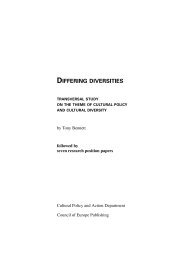Why we need European cultural policies: the impact of EU ...
Why we need European cultural policies: the impact of EU ...
Why we need European cultural policies: the impact of EU ...
You also want an ePaper? Increase the reach of your titles
YUMPU automatically turns print PDFs into web optimized ePapers that Google loves.
IPR legislation into line with World Intellectual Property Organization (WIPO) and World TradeOrganization (WTO) regulations, at <strong>the</strong> same time making preparations to meet relevant <strong>EU</strong>directives. As with <strong>the</strong> audio-visual and media sectors, legislation in most <strong>of</strong> <strong>the</strong>se countries wasamended several times during <strong>the</strong> transition 88 and only <strong>the</strong> most recent changes <strong>we</strong>re broughtabout by <strong>the</strong> <strong>need</strong> to harmonize with <strong>the</strong> acquis communautaire.Copyright has generally been perceived as an inseparable part <strong>of</strong> <strong>cultural</strong> <strong>policies</strong>, and specificinterests <strong>of</strong> <strong>the</strong> <strong>cultural</strong> sector have usually been taken into account. Much information about<strong>the</strong> most important changes in <strong>the</strong> IPR legislation can be found in <strong>the</strong> <strong>European</strong> Commission’s`progress reports’ as <strong>we</strong>ll as in <strong>the</strong> Compendium <strong>of</strong> <strong>cultural</strong> <strong>policies</strong> and trends in Europe(ERICarts/Council <strong>of</strong> Europe 2005).According to <strong>the</strong> Compendium most countries reported that <strong>the</strong>y have been following <strong>the</strong> civillaw droit d’auteur tradition.89 They have made changes to every aspect <strong>of</strong> <strong>the</strong>ir IPR legislationdirectly relevant for culture such as:■ extending rights for up to 70 years after <strong>the</strong> author’s death■ regulating resale <strong>of</strong> IPR products within <strong>the</strong> <strong>European</strong> Economic Area 90■ changing rental and lending rights.In spite <strong>of</strong> <strong>the</strong> various Europe-wide regulations, <strong>the</strong> way in which some important aspects <strong>of</strong> <strong>the</strong>IPR relevant for culture are regulated is still very varied. Examples <strong>of</strong> this include public lendingrights and also coordination bet<strong>we</strong>en <strong>the</strong> systems for managing and collecting <strong>the</strong> rights <strong>of</strong> artistsfrom different <strong>EU</strong> countries. What’s more, intellectual property rights have been one <strong>of</strong> <strong>the</strong> mostdebated, and sometimes controversial topics.91As with audio-visual legislation, where <strong>the</strong> revision <strong>of</strong> <strong>the</strong> Directive Television without frontiersis underway, <strong>the</strong> field <strong>of</strong> intellectual property is being constantly revised primarily in response todevelopments in digital technologies.Finally: regionalization and <strong>the</strong> `Copenhagen Criteria’There <strong>we</strong>re two o<strong>the</strong>r issues, which although not included in <strong>the</strong> survey, have been impinging on<strong>cultural</strong> policy-making.The first, which seems to have been connected indirectly with <strong>the</strong> accession process, is <strong>the</strong>change <strong>of</strong> territorial, or regional, organization <strong>of</strong> new member states. The Compendium <strong>of</strong> <strong>cultural</strong><strong>policies</strong> and trends in Europe stated that <strong>EU</strong> membership would compel Hungary and Slovenia t<strong>of</strong>inalize a new territorial organization. First Hungary:`The <strong>EU</strong> membership will compel Hungary into finalizing <strong>the</strong> (probably seven)regions and give <strong>the</strong>m real administrative po<strong>we</strong>r, including competence overregional <strong>cultural</strong> <strong>policies</strong>. The same reason has speeded up <strong>the</strong> formation <strong>of</strong> 167so-called small or micro-regions: <strong>the</strong>se are not yet full partners <strong>of</strong> <strong>the</strong> central60Part 2 The <strong>impact</strong> <strong>of</strong> <strong>EU</strong> enlargement: results <strong>of</strong> <strong>the</strong> survey <strong>of</strong> researchers and policy-makers














